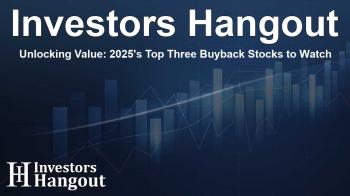Unlocking Value: 2025's Top Three Buyback Stocks to Watch

Unlocking Value in 2025: Promising Buyback Stocks
In the world of stocks, one strategy that continually catches the eye of investors is buybacks. These are increasingly vital for companies looking to stabilize or boost their share prices, particularly in uncertain market conditions. Three companies that stand out in this regard are Shoe Carnival (NASDAQ: SCVL), Mondelez (NASDAQ: MDLZ), and Kroger (NYSE: KR). Each of these companies recently announced major buyback initiatives that could enhance their stock performance in the coming years.
The prevailing question is whether these stocks will be classified as Buys, Sells, or Holds for 2025. The outlook is positive, leaning towards Buy for each, albeit for different reasons.
Shoe Carnival: An Undervalued Champion with a Strong Dividend
Shoe Carnival, while facing retail industry challenges, still shows commendable consistency in financial performance. With a robust framework, the company is executing a buyback strategy that includes up to $50 million aimed at enhancing shareholder value. However, it's important to note that their buybacks serve as a bridge for managing share-based compensation rather than a primary method of capital return.
Despite potential headwinds in 2024, Shoe Carnival’s operations have been stable, with improvements in their cash flow. The addition of Rogan’s stores has further expanded its footprint, showing that strategic acquisitions positively influence growth. By the end of their fiscal third quarter, the company reported increased cash and assets, illustrating its sound financial health.
Shoe Carnival has prioritized dividends, boasting a healthy yield of 1.6% at share prices near $34.25. Notably, dividends have increased for the past 12 consecutive years, indicating a commitment to returning value to shareholders. With expectations for further double-digit increases in early 2025, this stock secures its position as a Buy.
Mondelez: A Strong Commitment to Shareholder Returns
Next up is Mondelez, which has authorized a staggering $9 billion in buybacks. This substantial repurchase plan reflects the company’s confidence in sustaining shareholder returns, appreciated through dividend distributions and reduced share counts. With a decrease in share count by 1.9% year-over-year for Q3, Mondelez is actively managing its equity portfolio to enhance overall value.
Trading at a low multiple of 17 times earnings and yielding over 3%, Mondelez presents an appealing prospect for investors. The significant share repurchase combined with consistent dividend growth furthers the attractiveness of this stock. Analysts view Mondelez as undervalued, indicating a potential for healthy price appreciation with discounted trading prices around $59.50.
Kroger: Resilient in the Face of Challenges
Moving on to Kroger, this grocery giant recently authorized a $7.5 billion share buyback initiative. The company's financial metrics remain strong, providing the necessary foundation for substantial share repurchase programs. Even though Kroger’s planned acquisition of Albertsons was halted, the company is using its robust cash reserves for share buybacks.
This buyback represents about 17% of Kroger’s market capitalization, with $5.5 billion allocated for an accelerated program. This strategy not only reassures investors about future performance but also illustrates Kroger’s agility in capitalizing on opportunities even amidst setbacks.
Kroger's ability to adapt and strengthen its position through strategic buybacks speaks volumes about its management and operational efficiency. As the market shifts, Kroger remains committed to delivering shareholder value through sound financial practices and strategic buybacks.
Frequently Asked Questions
What are buybacks, and why are they important?
Buybacks occur when a company repurchases its own shares, often improving stock prices and increasing shareholder value by reducing the supply of shares in circulation.
How does Shoe Carnival's dividend policy impact its attractiveness as a stock?
Shoe Carnival has a longstanding tradition of increasing dividends, which signals financial stability and a commitment to returning value to shareholders, making it an appealing investment.
What sets Mondelez's buyback plan apart from others?
Mondelez's $9 billion buyback authorization is a significant commitment that demonstrates its focus on enhancing shareholder returns through both share reduction and an attractive dividend yield.
Can Kroger’s buyback strategy lead to long-term growth?
Yes, Kroger’s buyback program is designed to increase earnings per share over time, potentially leading to a higher stock price while providing immediate returns to investors.
What should investors consider before investing in these stocks?
Investors should evaluate the overall financial health, future growth prospects, and the company's history of capital returns before making investment decisions regarding these stocks.
About Investors Hangout
Investors Hangout is a leading online stock forum for financial discussion and learning, offering a wide range of free tools and resources. It draws in traders of all levels, who exchange market knowledge, investigate trading tactics, and keep an eye on industry developments in real time. Featuring financial articles, stock message boards, quotes, charts, company profiles, and live news updates. Through cooperative learning and a wealth of informational resources, it helps users from novices creating their first portfolios to experts honing their techniques. Join Investors Hangout today: https://investorshangout.com/
Disclaimer: The content of this article is solely for general informational purposes only; it does not represent legal, financial, or investment advice. Investors Hangout does not offer financial advice; the author is not a licensed financial advisor. Consult a qualified advisor before making any financial or investment decisions based on this article. The author's interpretation of publicly available data shapes the opinions presented here; as a result, they should not be taken as advice to purchase, sell, or hold any securities mentioned or any other investments. The author does not guarantee the accuracy, completeness, or timeliness of any material, providing it "as is." Information and market conditions may change; past performance is not indicative of future outcomes. If any of the material offered here is inaccurate, please contact us for corrections.
